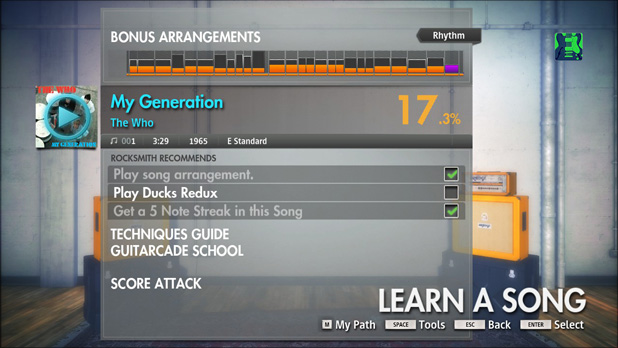
Last year the musical grip that Rockband had on gamers was substantially loosened. Ubisoft entered the arena with Rocksmith, a similarly styled game which allowed you to hook up a real guitar or bass and actually learn to play the brilliant array of songs included on the disc. There were flaws, and a few people were narked that they’d bought it to rock and roll only to find they were being retaught how to play, but it was still pretty tremendous. Rocksmith 2014 adds some new features, improves on a few issues from last time and gives a whole new collection of awesome music to strum along to. What’s not to like?
Rocksmith 2014 is still very much a teaching tool, lets make that clear. While it’s possible to ramp up the difficulty from the off, it’s still designed to make you a better musician, and that’s something that will still bug people who class themselves as “proper” musicians. There’s no way of failing, something which in itself is clearly there to safe morale of people trying to get the hang of things. If you start to screw up the song you’re on, it just knocks it down a peg and makes it a bit easier to manage. Start to nail a decent sequence of notes, and you’ll start to get tougher stuff to play along to – but you’re never stopped mid-song, you’ll just get a rating when you’ve finished along with some objectives to help you improve. It’s a slow burner for more experienced players, but ultimately after a bit of playing it all settles to your ability.

These objectives drive the main area of the game, and might be a challenge of a certain accuracy, score or perfecting a tricky part of the song by playing that chunk a few times over. They push you to leave your comfort zone, try new songs out and have a go at the other areas of the game instead of just repeatedly playing through your favourite song. Songs which, incidentally, behave slightly differently in action to what you’ll have played on Guitar Hero and Rockband. Real guitars mean more range, and your simple coloured 5 plastic buttons are now 20-odd frets across 6 (or 4) strings, something which makes quicker, more challenging songs a potential car crash. You still get notes floating down the screen to tell you what and when to play, but with the sheer number of notes on offer (and the fact that some chords could give you 6 notes at once) it’s a good job you can pause, rewind and slow down a song at points where you struggle. It’s all part of the learning process, and even a seasoned musician will find it handy. I’ve been playing both the guitar and the bass for nearly 20 years, and I found it hugely useful to get the hang of some of the riffs by taking a block of 8 bars and repeating it at progressively harder difficulties. It certainly gave me an appreciation for just how funky the bass line is to Walk This Way.
None of this is really new though, neither is the idea of the arcade games which have you practising various elements such as string selection and dynamics by playing some old-style arcade games using your guitar as your controller. They’re handy to have, and can be invaluable teaching and practising tools, but they won’t keep you busy for long. A complaint I made last year was the inability to skip the opening tutorial, which implied you’d never so much as seen a guitar before, never mind picked one up and comfortably strutted your stuff along to Sweet Home Chicago, but thankfully you can skip it this time and dive straight in. Phew.
The Session Mode though… now that is something worth mentioning. You pick a key to play in, as well as tempo and a few other options, then you get your band together. Four slots are available for you to fill with various guitars, basses, drums and keyboards to play along with you. And it’s actually that way round – they play along with you, not vice versa. You start playing, and Rocksmith figures out what you’ve got going on and the rest of the band join in. Want to rock out a bit and get the drummer to go slightly nuts? Start playing harder, faster and louder then, the rest of your band will follow suit. If you fancy a bit of a break and want to chill it out a bit, calm down your own playing and you’ll be drifting off into a virtual Belgian jazz bar in no time. It’s a very clever and interesting addition – I’ve included the trailer below for you, it’s the only way of really understanding just how cool it is.
Elsewhere Master Mode figures out when you’ve nailed a particular section of a track and fades the notes out, leaving you to play from memory for a few moments until the rest of the song kicks in with the usual prompts. The actual notes themselves have been tweaked too, so slides, hammers, tremolos and other techniques are more clearly marked and show you just what you should be doing to sound exactly like it was you on the Paranoid Android recording. You can also use the Nonstop Play option to set up your own playlist and go non-stop (hence the name) for as long as you decide; the game will even let you set a time limit to prevent those nasty wrist-aches from too much Nirvana fun. You can still emulate a bass with the bottom strings of a guitar, you can set it up to stick to a certain difficulty instead of dynamically changing it during the song, you can play happily if you’re left handed, pretty mcuh everything is covered. Care has clearly been taken to improve on the already impressive experience of the original Rocksmith, and the results are outstanding.
With a track listing that will keep you busy for a long time (plus the option to buy an import option to bring in the original Rocksmith songs), multiplayer options for you and a friend to rock together, the multitude of improvements and the awesome Session mode, there are a lot of reasons to look into buying Rocksmith. Whether you’re a seasoned pro who wants to grab those finer points of a track, or a total beginner who has the patience needed to slowly go from zero to hero, it’s all here. You can even just turn your TV into one of the several amps on offer and see how it sounds playing through a professional amp that’s well out of your financial reach, then lay your skills down over music by REM, Oasis, Foo Fighters and Muse, just before topping off your evening by squirting water from a whale’s blowpipe.
How can you say no?
Reviewed on PS3


Leave a Reply